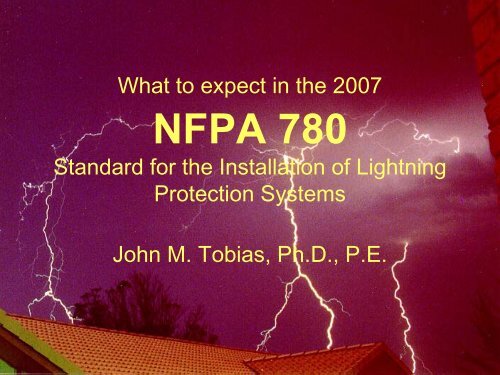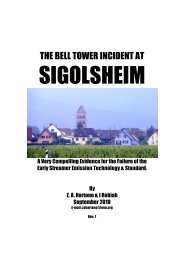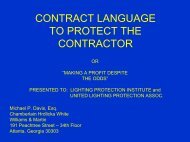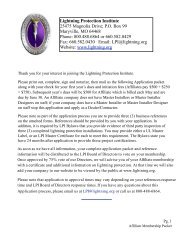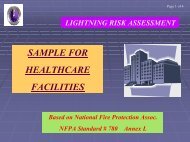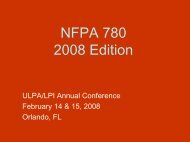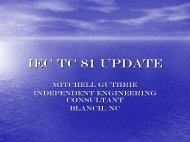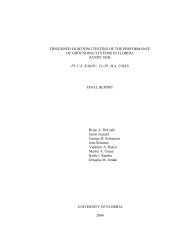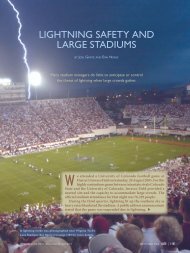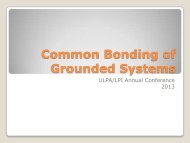NFPA 780 - Lightning Protection Institute
NFPA 780 - Lightning Protection Institute
NFPA 780 - Lightning Protection Institute
You also want an ePaper? Increase the reach of your titles
YUMPU automatically turns print PDFs into web optimized ePapers that Google loves.
What to expect in the 2007<br />
<strong>NFPA</strong> <strong>780</strong><br />
Standard for the Installation of <strong>Lightning</strong><br />
<strong>Protection</strong> Systems<br />
John M. Tobias, Ph.D., P.E.<br />
Presentation to LPI Meeting, March 2007
Presentation to LPI Meeting, March 2007
Objective<br />
Familiarize with major revisions for 2007<br />
<strong>NFPA</strong> <strong>780</strong>.<br />
The topics presented are the final actions<br />
for the new standard, due out after the<br />
June <strong>NFPA</strong> meeting.<br />
Look on www.nfpa.org for the ROC text.<br />
Presentation to LPI Meeting, March 2007
Status<br />
•Completed ‘Report on Comments’ (ROC)<br />
phase.<br />
•Committee Balloted on Proposals<br />
•43 Comments<br />
– 9 Rejected.<br />
– 1 on ‘hold.’ (Risk Assessment.)<br />
– Remainder accepted in some fashion.<br />
•Next step is <strong>NFPA</strong> Annual Meeting<br />
Presentation to LPI Meeting, March 2007
Editorial Changes<br />
Many revisions editorial in nature, for example:<br />
• No more ground ‘terminals,’ now electrodes.<br />
• Conversions to metric (w/ SAE units.)<br />
• ‘Persons’ vice ‘Personnel.’<br />
• Communications as a generality.<br />
• Preserved unique (and added) definitions.<br />
Presentation to LPI Meeting, March 2007
Use of Aluminum<br />
Several revised articles:<br />
• Clarified intent to separate copper/aluminum<br />
LP and structural materials. (4.2.3, 4.2.4, 4.5.1)<br />
• Clarified intent not to use close to earth.<br />
(4.5.2) Permits use in structure interior below<br />
grade.<br />
Presentation to LPI Meeting, March 2007
Strike Terminations<br />
• Clarified permitting combination strike<br />
terminations (4.6.1.5).<br />
• Permits combination of methods to determine<br />
strike termination placement. (4.7)<br />
• Clarification of Zone of <strong>Protection</strong> (4.7.2.2 &<br />
4.7.3.1)<br />
• <strong>Protection</strong> of Roof Top Units (HVAC, etc.)<br />
(4.8.8.5)<br />
Presentation to LPI Meeting, March 2007
Strike Terminations<br />
Proposal to decrease termination to edge<br />
interval revisited. (Accepted in Principle.)<br />
Presentation to LPI Meeting, March 2007
Strike Terminations<br />
Committee Meeting Action: Accept in Principle<br />
Change 4.8.2 to read as follows:<br />
4.8.2* Location of Devices. As shown in Figure 4.8.2, the<br />
distance between strike termination devices and ridge ends on<br />
pitched roofs or edges and outside corners of flat or gently<br />
sloping roofs shall not exceed 0.6 m (2 ft).<br />
Add annex A.4.8.2 to read as follows:<br />
A.4.8.2 Strike termination devices should be placed as close<br />
as practicable to roof edges and outside corners.<br />
Presentation to LPI Meeting, March 2007
Handrails as Conductors<br />
4.9.3.2 Permanent exterior metal handrails<br />
and ladders that are subject to direct lightning<br />
strikes (e.g., on roofs or between roofs) and<br />
are electrically continuous shall be permitted<br />
to be used as main conductors where the<br />
minimum thickness is 1.63 mm (0.064 in).<br />
Presentation to LPI Meeting, March 2007
Handrails as Conductors<br />
• Concern over decreased human safety.<br />
• Rationale is that it is impossible to keep<br />
current off of this type of handrail and<br />
permitting it’s use as a conductor<br />
simplifies implementation.<br />
Presentation to LPI Meeting, March 2007
Bonding<br />
General provision to strengthen bonding<br />
requirements.<br />
• Metallic piping. (4.20.1.1)<br />
• Ground electrodes of different systems.<br />
(4.14.1)<br />
• Prohibition of piping use as electrode.<br />
(4.13.1.3)<br />
Intent is to prevent lightning damage observed<br />
on metallic piping systems in the past few<br />
years.<br />
Presentation to LPI Meeting, March 2007
Grounding<br />
• No more terminals! Electrodes instead!<br />
• Clarifies ground rod depth vs. separation<br />
effects. (4.13.2.4)<br />
• Complete rewrite of 4.13.8.1 (Shallow Topsoil)<br />
– Clarifies requirements for electrode depth.<br />
– Permits ring, radial or plate electrode and<br />
combinations thereof.<br />
Presentation to LPI Meeting, March 2007
Strike Terminations on Roofs<br />
“4.8.7.1 Wind Turbines. Zones of <strong>Protection</strong><br />
for Wind Turbines will consider their blade<br />
diameter and have no part outside of a zone of<br />
protection afforded by the blades.<br />
See Annex for additional information.”<br />
Presentation to LPI Meeting, March 2007
Surge <strong>Protection</strong><br />
• New Definitions/Figure of Merit<br />
– Nominal Discharge Current (In)<br />
– Voltage <strong>Protection</strong> Level VPL<br />
– Broadens category of SPD (previously<br />
covered under TVSS).<br />
• Also clarification of requirements.<br />
Changes coordinate with upcoming UL<br />
1449 3 rd ed. to facilitate selection and<br />
inspection.<br />
Presentation to LPI Meeting, March 2007
Stacks<br />
• Clarified definition of heavy-duty stack.<br />
(6.1)<br />
• Permits materials other than lead<br />
coatings. (6.4.1.1)<br />
• Clarifies air terminal placement. (6.4.2.2)<br />
• Clarifies electrode requirement (6.10.2)<br />
Presentation to LPI Meeting, March 2007
Watercraft<br />
• Entirely rewritten Chapter 8, <strong>Protection</strong><br />
for Watercraft.<br />
Dr. Ewen Thomson, with 15+ years of<br />
experience designing shipboard lightning<br />
protection and damage investigation was<br />
contributor to committee.<br />
Presentation to LPI Meeting, March 2007
Annexes<br />
• Significant addition to Annex A for surge<br />
protection.<br />
• Revised Annex B (Principles of <strong>Lightning</strong><br />
<strong>Protection</strong>)<br />
• Revisions to Tree <strong>Protection</strong>, Annex F.<br />
• New Annex O – <strong>Protection</strong> for Wind<br />
Turbines.<br />
Presentation to LPI Meeting, March 2007
Annexes<br />
• Held major revisions to Annex L – Risk<br />
Assessment for next cycle.<br />
• Added new flash density map to provide<br />
better statistical average (and retained old<br />
map for clarity.)<br />
Presentation to LPI Meeting, March 2007
Presentation to LPI Meeting, March 2007
Equipotential Bonding<br />
Problem: AHJs in several locations not<br />
permitting the bonding of metal piping systems<br />
to LP components.<br />
Cause(s): Bonding practices permitted in the<br />
2005 NEC (Art. 250.104(B)<br />
Wording in other standards that prohibit use of<br />
metal piping systems for ground electrodes.<br />
AHJs not understanding the difference between<br />
grounding and bonding. (Despite good example<br />
in the 2005 NEC Handbook.)<br />
Presentation to LPI Meeting, March 2007
Equipotential Bonding<br />
Standards affected:<br />
• <strong>NFPA</strong> 13 Installation of Sprinkler<br />
Systems,<br />
•<strong>NFPA</strong> 24 Installation of Private Service<br />
Fire Mains etc.,<br />
•<strong>NFPA</strong> 54 National Fuel Gas Code<br />
Presentation to LPI Meeting, March 2007
Equipotential Bonding<br />
Root cause<br />
A change to NEC (between 1999 & 2002)<br />
put ‘gas piping’ into the section of ‘other<br />
metal piping.’<br />
This change permits bonding only through<br />
appliance grounding conductor.<br />
Presentation to LPI Meeting, March 2007
Equipotential Bonding<br />
Actions of the <strong>780</strong> Committee:<br />
• Submitted proposals to <strong>NFPA</strong> 24<br />
(Subsequently rejected.)<br />
• Filed Notice of Intent: Successfully protested<br />
rejection at <strong>NFPA</strong> annual meeting. (13 & 24)<br />
• Submitted comment to <strong>NFPA</strong> 70.<br />
• Began dialog with <strong>NFPA</strong> 54, intend to set up<br />
joint working group.<br />
Presentation to LPI Meeting, March 2007
Initiatives for Next Cycle<br />
• Complete risk assessment proposal.<br />
• Incorporate new grounding findings.<br />
• Renew efforts for strike modeling & air<br />
terminal placement / tall structures.<br />
• Examine new surge protection findings.<br />
• Explosives / Flammables integrated<br />
(normative) chapter.<br />
Presentation to LPI Meeting, March 2007
Conclusion<br />
• <strong>NFPA</strong> <strong>780</strong> undergoing several changes,<br />
affecting installation requirements.<br />
• Addressing emerging industries, like<br />
wind turbines.<br />
• Addressing new findings in lightning<br />
related research.<br />
• Beginning planning for next cycle.<br />
Presentation to LPI Meeting, March 2007
<strong>NFPA</strong> <strong>780</strong> is your standard.<br />
Participate!<br />
Presentation to LPI Meeting, March 2007
National Geographic<br />
Photo<br />
Presentation to LPI Meeting, March 2007
Presentation to LPI Meeting, March 2007
Presentation to LPI Meeting, March 2007


